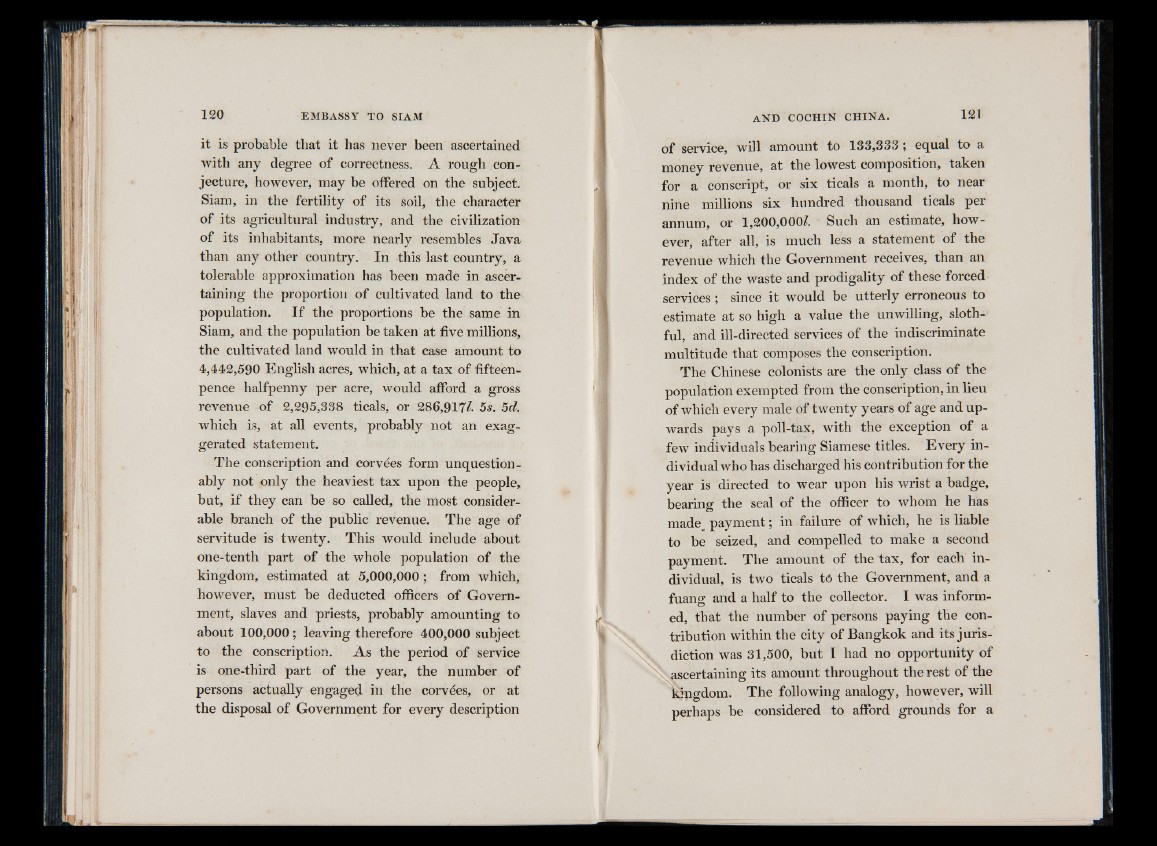
it is probable that it has never been ascertained
with any degree of correctness. A rough conjecture,
however, may be offered on the subject.
Siam, in the fertility of its soil, the character
of its agricultural industry, and the civilization
of its inhabitants, more nearly resembles Java
than any other country. In this last country, a
tolerable approximation has been made in ascertaining
the proportion of cultivated land to the
population. I f the proportions be the same in
Siam, and the population be taken at five millions,
the cultivated land would in that case amount to
4,442,590 English acres, which, at a tax of fifteen-
pence halfpenny per acre, would afford a gross
revenue of 2,295,338 ticals, or 286,917/- 5s. 5d.
which is, at all events, probably not an exaggerated
statement.
The conscription and corvées form unquestionably
not only the heaviest tax upon the people,
but, if they can be so called, the most considerable
branch of the public revenue. The age of
servitude is twenty. This would include about
one-tenth part of the whole population of the
kingdom, estimated at 5,000,000 ; from which,
however, must be deducted officers of Government,
slaves and priests, probably amounting to
about 100,000 ; leaving therefore 400,000 subject
to the conscription. As the period of service
is one-third part of the year, the number of
persons actually engaged in the corvées, or at
the disposal of Government for every description
of service, will amount to 133,333; equal to a
money revenue, at the lowest composition, taken
for a conscript, or six ticals a month, to near
nine millions six hundred thousand ticals per
annum, or 1,200,000/. Such an estimate, however,
after all, is much less a statement of the
revenue which the Government receives, than an
index of the waste and prodigality of these forced
services ; since it would be utterly erroneous to
estimate at so high a value the unwilling, slothful,
and ill-directed services of the indiscriminate
multitude that composes the conscription.
The Chinese colonists are the only class of the
population exempted from the conscription, in lieu
of which every male of twenty years of age and upwards
pays a poll-tax, with the exception of a
few individuals bearing Siamese titles. Every individual
who has discharged his contribution for the
year is directed to wear upon his wrist a badge,
bearing the seal of the officer to whom he has
made, payment; in failure of which, he is liable
to be seized, and compelled to make a second
payment. The amount of the tax, for each individual,
is two ticals to the Government, and a
fuang and a half to the collector. I was informed,
that the number of persons paying the contribution
within the city of Bangkok and its jurisdiction
was 31,500, but I had no opportunity of
^ascertaining its amount throughout the rest of the
kingdom. The following analogy, however, will
perhaps be considered to afford grounds for a